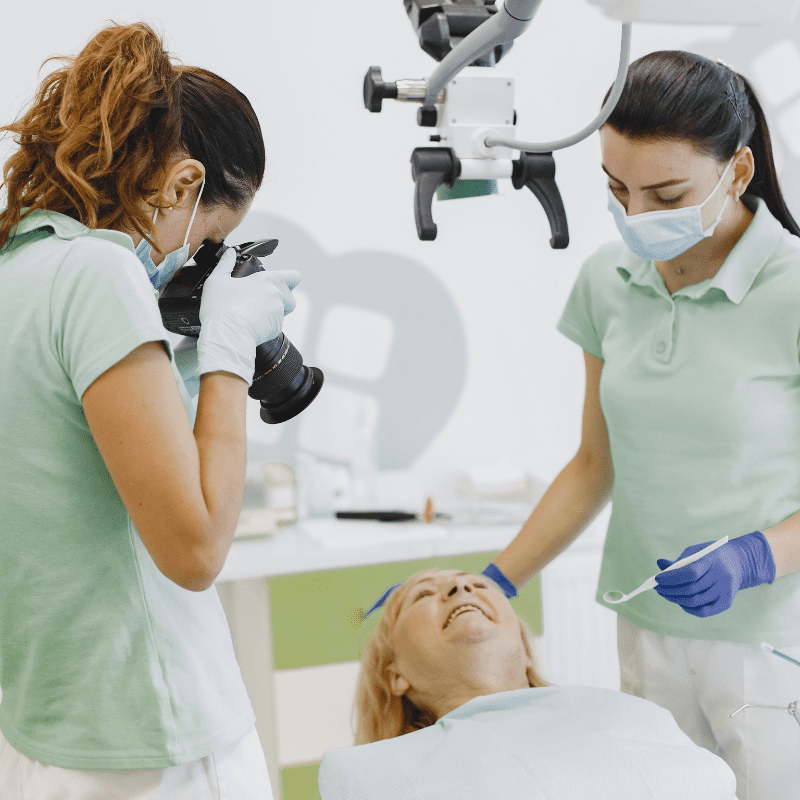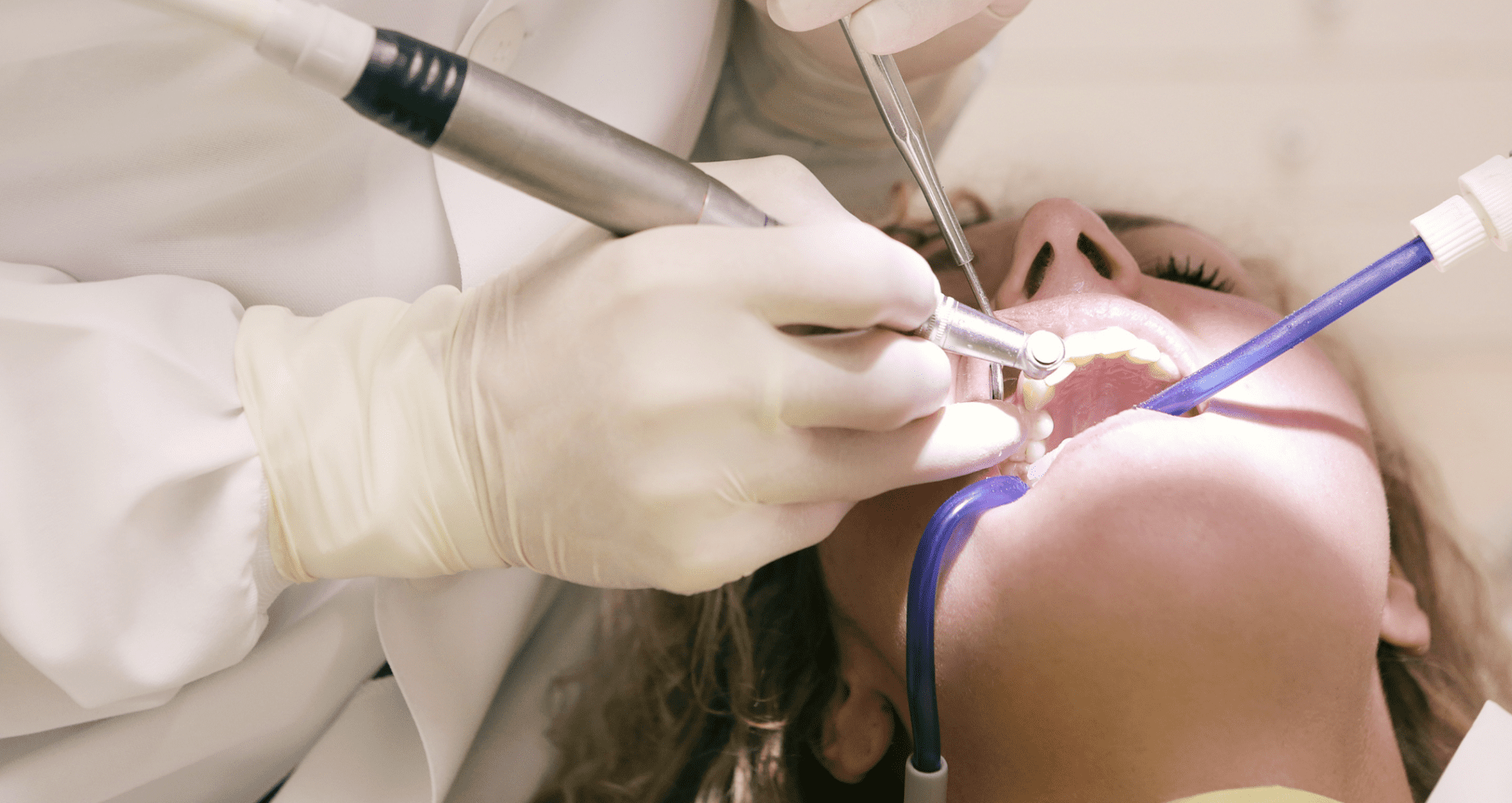At Advanced Indiana, we prioritize not only your dazzling smile but also the holistic health it represents. An area of dental care that often goes overlooked, but is intrinsically linked to our overall well-being, is the connection between dental care and sleep apnea.
This sleep disorder, characterized by repeated interruptions in breathing during sleep, can have profound implications on your daily life, overall health, and even longevity. Surprisingly for many, your mouth, jaw, and throat play significant roles in the onset and management of sleep apnea. In this blog, we’ll delve deep into the relationship between dental care and sleep apnea, illuminating ways in which optimal oral health can pave the way for restful nights and energetic days.
What is Sleep Apnea?
Sleep apnea is a common condition where individuals experience repeated pauses and restarts in their breathing while asleep. This pattern can lead to insufficient oxygen intake by the body. If you’re informed that you snore loudly or make gasping sounds during sleep, or if you encounter signs like extreme daytime sleepiness, it’s crucial to reach out to your doctor for potential sleep apnea. People with sleep apnea may also be at risk for elevated blood pressure, heart rate irregularities, heart diseases, and low oxygen levels. Severe sleep apnea intensifies these risks. A comprehensive evaluation, including a physical exam, can help determine the presence and severity of sleep apnea. Based on the findings, a personalized treatment plan can be developed to enhance your sleep quality and overall well-being.

Types of Sleep Apnea
There are three main types of sleep apnea: obstructive sleep apnea (OSA) and central sleep apnea (CSA and complex sleep apnea).
Occurs when your upper airway repeatedly becomes clogged as you sleep, reducing or altogether stopping airflow. This is the most common type of obstructive sleep apnea. Obesity, huge tonsils, or hormonal changes can all constrict your airway and raise your risk of obstructive sleep apnea.
Occurs when your brain fails to transmit the necessary signals for breathing. Central sleep apnea syndrome can be caused by medical disorders that impair how your brain regulates your airway and chest muscles.
Also known as complex sleep apnea. As the name implies, some people suffer from both OSA and CA at the same time. This is referred to as mixed apnea.
Causes
Sleep apnea can be caused by various factors and certain medical conditions. Let’s take a closer look at the causes and symptoms of sleep apnea:
1. Obstructive Sleep Apnea Syndrome (OSA):
-
- Anatomical Features: Certain physical traits, like having a narrow airway, large tonsils, impaired muscle activity, or a recessed jaw, can increase the risk of OSA.
- Excess Weight: Obesity can lead to fat deposits in the upper airway, promoting the development of excess soft tissue in the mouth, making it more likely to become blocked during sleep.
- Age: OSA is more common as people get older, possibly due to muscle tone changes.
- Gender: Men are more at risk for sleep apnea than women.
- Family History: If your family has a history of sleep apnea, you might be at a higher risk.
2. Central Sleep Apnea Syndrome (CSA):
-
- Heart Disorders: Cardiovascular diseases like congestive heart failure and atrial fibrillation can disrupt the brain’s control over breathing.
- Brainstem Issues: Problems with the part of the brain that controls breathing can lead to CSA.
- Certain Medications: Opioid pain medications and other drugs can affect the brain’s breathing centers.
Symptoms
Sleep apnea symptoms may vary from person to person but here are some of the common symptoms:
- Loud Snoring: Often the most noticeable symptom, especially in OSA.
- Pauses in Breathing: Often leads to restless sleep and is witnessed by a partner or family member.
- Gasping or Choking: Waking up abruptly with a feeling of suffocation due to lack of oxygen or nasal congestion
- Daytime Drowsiness: Feeling excessively tired during the day, no matter how much you’ve slept due to disrupted REM sleep.
Treatment of Sleep Apnea
The appropriate medical treatment for sleep apnea will be determined by a healthcare professional based on factors such as the type of sleep apnea, its severity, the individual’s overall health, and personal preferences. Some of the common treatments include:
1. Lifestyle Changes:
-
- Weight Management: Losing excess weight can often help reduce the severity of obstructive sleep apnea (OSA), particularly if weight gain has contributed to the condition.
- Positional Therapy: Changing sleeping positions, such as sleeping on your side instead of your back, may help prevent airway obstruction in some cases.
2. Continuous Positive Airway Pressure Therapy (CPAP):
-
- CPAP therapy is a common and highly effective treatment for moderate to severe OSA. A CPAP machine delivers a continuous stream of air through a mask worn over the nose and/or mouth, preventing the airway from collapsing during sleep.
3. Bi-level Positive Airway Pressure Therapy (BiPAP):
-
- Similar to CPAP, a BiPAP machine delivers varying levels of air pressure based on whether you’re inhaling or exhaling. It’s often used for individuals who have trouble tolerating CPAP.
4. Oral Appliance Therapy:
-
- Dental sleep medicine professionals can design and fit custom oral appliances that reposition the lower jaw and tongue to keep the airway open. These are particularly effective for mild to moderate OSA or for individuals who cannot tolerate CPAP.
5. Surgical Treatment
-
- Obstructive sleep apnea treatment sometimes considers surgical options such as correction of nasal passages, throat muscles, and reduction of excess tissue may be considered if other treatments are ineffective or not suitable.
Untreated sleep apnea may affect our mental and physical health that’s why it’s important to consult health professionals as soon as the symptoms occur.
What is Dental Sleep Medicine?
Dental sleep medicine is a subspecialty of dentistry that focuses on the connection between oral health and sleep problems, specifically sleep apnea. It entails using mouth appliances and other dental procedures to diagnose, treat, and control sleep-related respiratory health conditions. Dental sleep medicine practitioners collaborate with sleep physicians and other healthcare providers to provide complete care for people suffering from severe sleep apnea and other sleep-related disorders.

How does dental care relate with sleep apnea?
Dental care and sleep apnea are interconnected through the specialized field of dental sleep medicine. Dental professionals can play a significant role in recognizing, treating, and managing sleep apnea, a sleep disorder characterized by interrupted breathing during sleep. The relationship between dental care and sleep apnea primarily revolves around the use of oral appliances as a treatment approach. Here’s how dental care is related to sleep apnea:
Oral Appliance Therapy
Specially trained dentists provide custom devices that reposition the jaw and tongue during sleep, keeping the airway open, resulting to restful sleep and preventing sleep deprivation. Effective for mild to moderate OSA and CPAP-intolerant individuals.
Diagnosis & Screening
Dentists spot sleep apnea risk factors in checkups. Traits like narrow airway or teeth grinding indicate sleep issues. Working with sleep specialists ensures accurate diagnosis, care, and rule out other sleep disorders.
Collaboration
Dental pros team up with sleep physicians and healthcare providers for comprehensive sleep apnea care. This approach boosts treatment effectiveness and holistic patient well-being.
Monitoring
Dental sleep medicine experts track oral appliance therapy progress. Regular visits adjust the device and ensure optimal results.
Education
Dental care providers inform patients about oral health’s ties to sleep apnea and encourage seeking medical help for sleep-related concerns.
Unlock better sleep through dental care with Advanced Indiana
Explore the transformative impact of Advanced Indiana’s specialized approach to dental care on your sleep quality. Uncover the unique connection between oral health and sleep apnea, and learn how their expertise can lead you to restful nights and revitalized days. Don’t miss the chance to experience the difference – delve into the world where advanced dental care meets enhanced sleep, only with Advanced Indiana!
Whether you’re looking to brighten your smile, handle emergencies, or enhance your teeth From teeth whitening to dental implants, we’re your nearby dental experts! With a legacy of 25+ years serving Anderson and Fortville, we’re here to transform your dental experience. Contact us now and become part of the Advanced Dental Care family!
Credits:
Photo by Andrea Piacquadio
Photo by Kampus Production
Photo by Gustavo Fring

